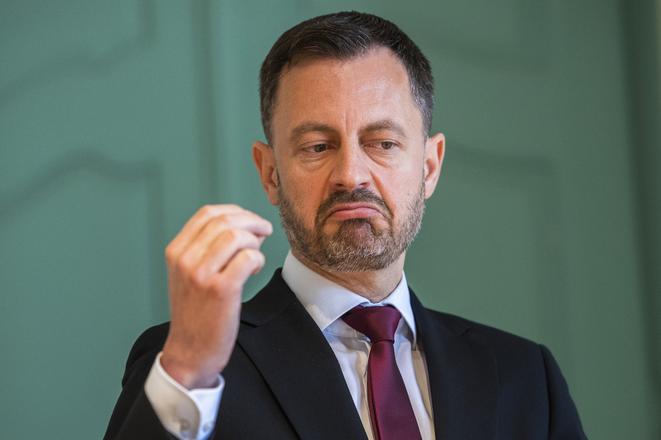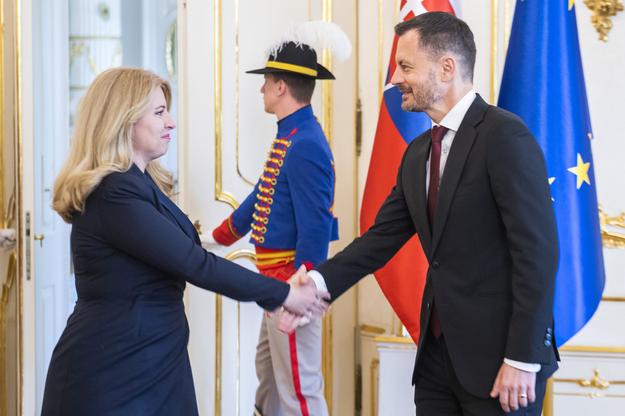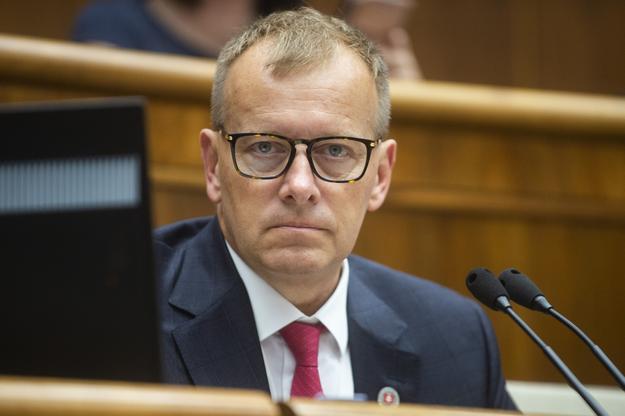Prime Minister Eduard Heger has reiterated that his priority is to walk out of the coalition crisis without losing any of the four coalition parties.
He has not ruled out the scenario that would involve a minority government, though.He has not ruled out the scenario that would involve a minority government, though.
“A minority government whether followed by an early election or not would only be the result of the collapse of the four-party coalition,” Heger (OĽaNO) posted on Facebook on Saturday, July 23.
The SaS party, a coalition party, has conditioned staying in the government with the dismissal of conflict-seeking Finance Minister Igor Matovič and signing a new coalition deal. The party has already quit the coalition club.
A similar situation occurred during the first coalition crisis in spring 2021, which ended after Matovič resigned as prime minister.

The second coalition crisis in two years sparked due to growing tensions between Finance Minister and OĽaNO chair Igor Matovič and Economy Minister and SaS chair Richard Sulík following a failed parliamentary vote on a prosecutor’s request for the arrest of Smer MP and ex-prime minister Robert Fico back in May 2022. Matovič’s costly package of economic measures, which is said to help families but has been opposed by SaS and was passed in parliament with the help of votes coming from extremist MPs, then aggravated the crisis.
Sulík: Minority government serves OĽaNO’s interests
Following a meeting with President Zuzana Čaputová on Friday, July 22, Heger said the coalition crisis revolves around the persona of Matovič. The prime minister blames public polls, which show that Matovič is the least trusted politician of the government, for the disputes in the coalition government.
“In democratic countries, it is voters that should decide on it [composition of a coalition] in elections,” the prime minister said, criticising the polls.
The president said that the coalition crisis cannot paralyse the state and expects Heger to resolve the crisis as soon as possible. She added one of the solutions might be the removal of some ministers - Matovič and Sulík - from their posts.
Heger expects that a final decision on the future of the current coalition government will be announced at the end of the summer, when the SaS’ deadline for Heger to sack Matovič expires.
On July 16, Heger discussed the crisis with Sulík one on one. They were reluctant to change their positions. Heger and OĽaNO refuse to accept SaS’ demand regarding Matovič’s removal.
“If the prime minister prefers a minority government to the removal of one problematic person, we cannot talk about the interests of the country, but purely about the interests of the OĽaNO party,” said Sulík on July 22, as quoted by the TASR news agency.
The SaS chair stressed there are only two solutions to the crisis: the removal of Matovič or the departure of the SaS party from the government.
Opposition’s no-confidence vote proposal
If the party ended up in the opposition, it might still attempt to remove Matovič from the ministerial chair, the Sme daily reported.
Some SaS members have told the daily they would not mind voting for such a proposal, even if it were put forward by the opposition parties Smer or Hlas. SaS has long fought against Fico’s Smer party. However, if the proposal were submitted by one of the two extremist parties, ĽSNS or Republika, the SaS party would not back it.
Smer, Hlas, ĽSNS, Republika and SaS would have 73 votes in parliament, but they would need 76 votes to pass the proposal. Therefore, they would have to seek support among non-affiliated MPs.
Another coalition party, Sme Rodina, has announced some of these MPs should join its parliamentary caucus after the summer.
Sme Rodina open to early election
As for the coalition crisis, Speaker of Parliament and Sme Rodina chair Boris Kollár told TV news channel TA3 on July 24 that his party would not oppose reopening the valid coalition deal. Kollár had previously refused.
At the same time, he is convinced the government will fall apart if the OĽaNO and SaS parties do not make a compromise. Kollár rejected the idea of a caretaker government on Sunday.
He also said Sme Rodina would not be part of a government that would depend on the votes of extremist MPs. Yet, he sees no problem in extremist MPs voting for the coalition’s bills in parliament.
The Sme Rodina chair added he would support an early election if the government lost the majority in parliament. Without the SaS party, the coalition government would have 69 MPs and would have to rely on non-affiliated lawmakers.
Kollár went on to note that he would submit a proposal to the parliament in September to change the Constitution and allow for a government to be removed by referendum.
However, any changes to the Constitution would require the support of at least 90 MPs.


 PM Eduard Heger after a meeting with President Zuzana Čaputová on July 22, 2022, in Bratislava. (source: TASR - Jaroslav Novák)
PM Eduard Heger after a meeting with President Zuzana Čaputová on July 22, 2022, in Bratislava. (source: TASR - Jaroslav Novák)
 President Zuzana Čaputová and PM Eduard Heger shake hands at the Presidential Palace on July 22, 2022. (source: TASR - Jaroslav Novák)
President Zuzana Čaputová and PM Eduard Heger shake hands at the Presidential Palace on July 22, 2022. (source: TASR - Jaroslav Novák)
 Speaker of Parliament Boris Kollár. (source: TASR - Jakub Kotian)
Speaker of Parliament Boris Kollár. (source: TASR - Jakub Kotian)